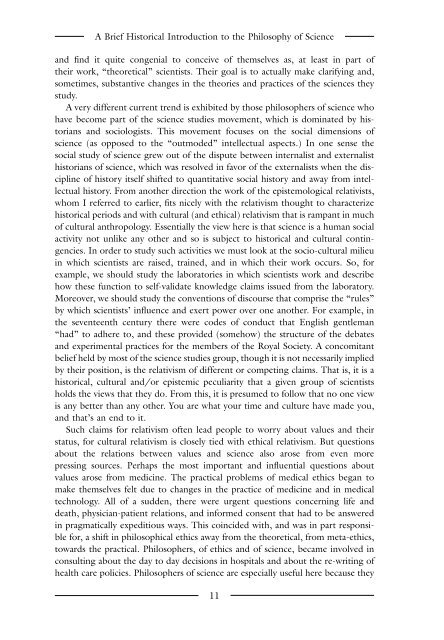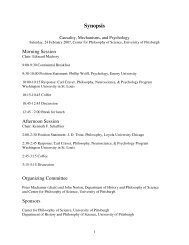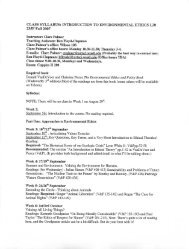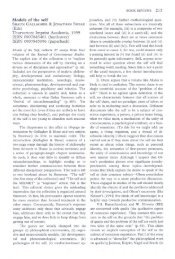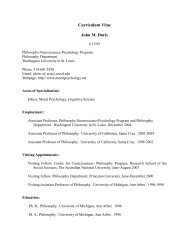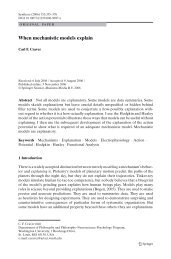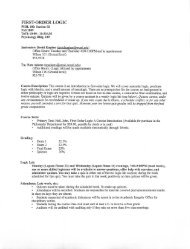The Blackwell Guide to the Philosophy of Science - The Department ...
The Blackwell Guide to the Philosophy of Science - The Department ...
The Blackwell Guide to the Philosophy of Science - The Department ...
You also want an ePaper? Increase the reach of your titles
YUMPU automatically turns print PDFs into web optimized ePapers that Google loves.
A Brief His<strong>to</strong>rical Introduction <strong>to</strong> <strong>the</strong> <strong>Philosophy</strong> <strong>of</strong> <strong>Science</strong><br />
and find it quite congenial <strong>to</strong> conceive <strong>of</strong> <strong>the</strong>mselves as, at least in part <strong>of</strong><br />
<strong>the</strong>ir work, “<strong>the</strong>oretical” scientists. <strong>The</strong>ir goal is <strong>to</strong> actually make clarifying and,<br />
sometimes, substantive changes in <strong>the</strong> <strong>the</strong>ories and practices <strong>of</strong> <strong>the</strong> sciences <strong>the</strong>y<br />
study.<br />
A very different current trend is exhibited by those philosophers <strong>of</strong> science who<br />
have become part <strong>of</strong> <strong>the</strong> science studies movement, which is dominated by his<strong>to</strong>rians<br />
and sociologists. This movement focuses on <strong>the</strong> social dimensions <strong>of</strong><br />
science (as opposed <strong>to</strong> <strong>the</strong> “outmoded” intellectual aspects.) In one sense <strong>the</strong><br />
social study <strong>of</strong> science grew out <strong>of</strong> <strong>the</strong> dispute between internalist and externalist<br />
his<strong>to</strong>rians <strong>of</strong> science, which was resolved in favor <strong>of</strong> <strong>the</strong> externalists when <strong>the</strong> discipline<br />
<strong>of</strong> his<strong>to</strong>ry itself shifted <strong>to</strong> quantitative social his<strong>to</strong>ry and away from intellectual<br />
his<strong>to</strong>ry. From ano<strong>the</strong>r direction <strong>the</strong> work <strong>of</strong> <strong>the</strong> epistemological relativists,<br />
whom I referred <strong>to</strong> earlier, fits nicely with <strong>the</strong> relativism thought <strong>to</strong> characterize<br />
his<strong>to</strong>rical periods and with cultural (and ethical) relativism that is rampant in much<br />
<strong>of</strong> cultural anthropology. Essentially <strong>the</strong> view here is that science is a human social<br />
activity not unlike any o<strong>the</strong>r and so is subject <strong>to</strong> his<strong>to</strong>rical and cultural contingencies.<br />
In order <strong>to</strong> study such activities we must look at <strong>the</strong> socio-cultural milieu<br />
in which scientists are raised, trained, and in which <strong>the</strong>ir work occurs. So, for<br />
example, we should study <strong>the</strong> labora<strong>to</strong>ries in which scientists work and describe<br />
how <strong>the</strong>se function <strong>to</strong> self-validate knowledge claims issued from <strong>the</strong> labora<strong>to</strong>ry.<br />
Moreover, we should study <strong>the</strong> conventions <strong>of</strong> discourse that comprise <strong>the</strong> “rules”<br />
by which scientists’ influence and exert power over one ano<strong>the</strong>r. For example, in<br />
<strong>the</strong> seventeenth century <strong>the</strong>re were codes <strong>of</strong> conduct that English gentleman<br />
“had” <strong>to</strong> adhere <strong>to</strong>, and <strong>the</strong>se provided (somehow) <strong>the</strong> structure <strong>of</strong> <strong>the</strong> debates<br />
and experimental practices for <strong>the</strong> members <strong>of</strong> <strong>the</strong> Royal Society. A concomitant<br />
belief held by most <strong>of</strong> <strong>the</strong> science studies group, though it is not necessarily implied<br />
by <strong>the</strong>ir position, is <strong>the</strong> relativism <strong>of</strong> different or competing claims. That is, it is a<br />
his<strong>to</strong>rical, cultural and/or epistemic peculiarity that a given group <strong>of</strong> scientists<br />
holds <strong>the</strong> views that <strong>the</strong>y do. From this, it is presumed <strong>to</strong> follow that no one view<br />
is any better than any o<strong>the</strong>r. You are what your time and culture have made you,<br />
and that’s an end <strong>to</strong> it.<br />
Such claims for relativism <strong>of</strong>ten lead people <strong>to</strong> worry about values and <strong>the</strong>ir<br />
status, for cultural relativism is closely tied with ethical relativism. But questions<br />
about <strong>the</strong> relations between values and science also arose from even more<br />
pressing sources. Perhaps <strong>the</strong> most important and influential questions about<br />
values arose from medicine. <strong>The</strong> practical problems <strong>of</strong> medical ethics began <strong>to</strong><br />
make <strong>the</strong>mselves felt due <strong>to</strong> changes in <strong>the</strong> practice <strong>of</strong> medicine and in medical<br />
technology. All <strong>of</strong> a sudden, <strong>the</strong>re were urgent questions concerning life and<br />
death, physician-patient relations, and informed consent that had <strong>to</strong> be answered<br />
in pragmatically expeditious ways. This coincided with, and was in part responsible<br />
for, a shift in philosophical ethics away from <strong>the</strong> <strong>the</strong>oretical, from meta-ethics,<br />
<strong>to</strong>wards <strong>the</strong> practical. Philosophers, <strong>of</strong> ethics and <strong>of</strong> science, became involved in<br />
consulting about <strong>the</strong> day <strong>to</strong> day decisions in hospitals and about <strong>the</strong> re-writing <strong>of</strong><br />
health care policies. Philosophers <strong>of</strong> science are especially useful here because <strong>the</strong>y<br />
11


